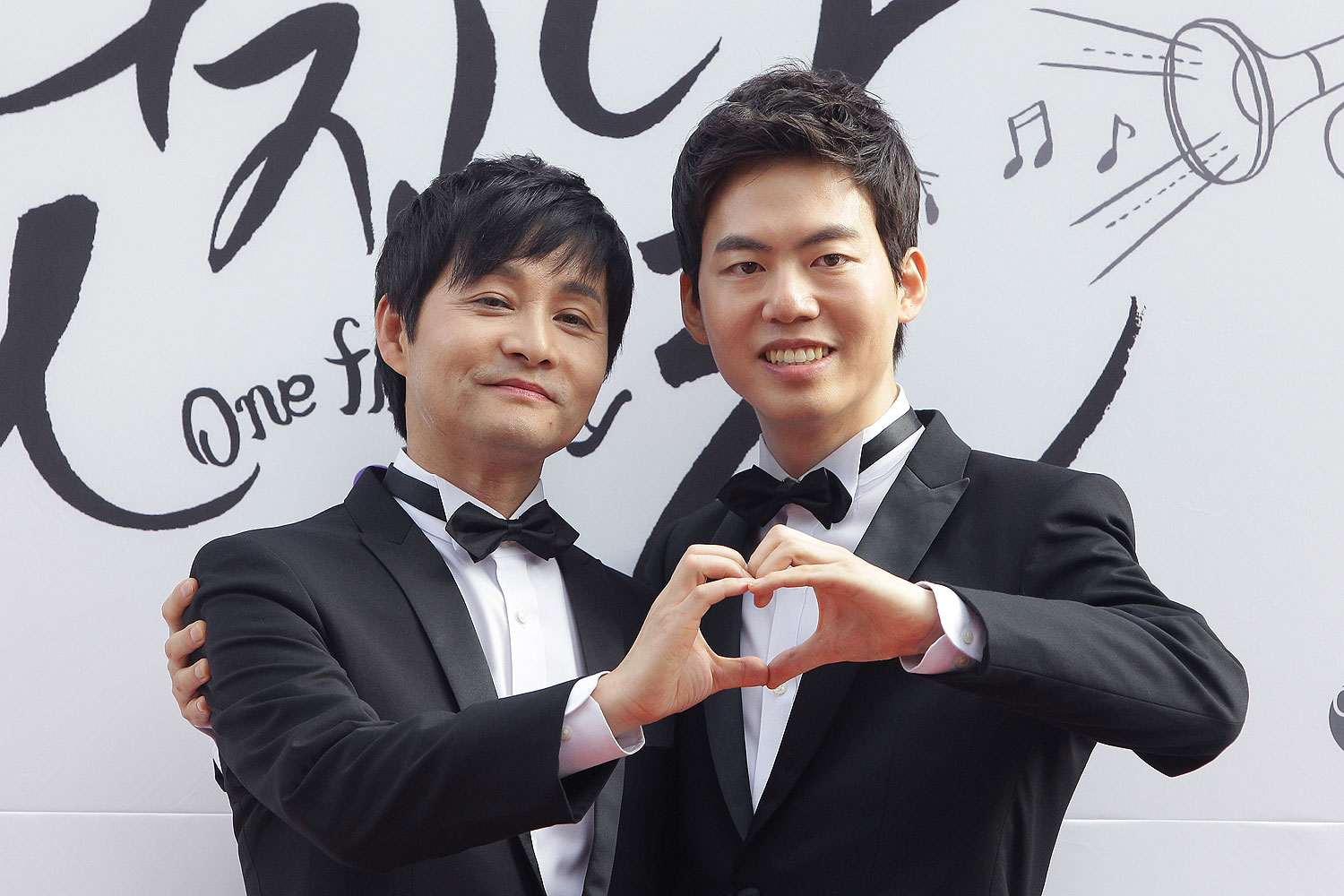
Last September, two men held South Korea‘s first same-sex wedding on a bridge in Seoul, to the applause of hundreds of guests and the soaring voices of a choir. The ceremony carried no legal weight — same-sex unions are not recognized in South Korea — but the couple and their legal advisers are now moving forward with a legal challenge that they hope will put South Korea in the vanguard of same-sex equality in Asia.
The cause is being helped by the fact that the Kims are high-profile professionals from South Korea’s glamorous film industry. Kim Jho Gwang-su, 48, is a prominent director, while producer Kim Seung-hwan, 29, is CEO of Rainbow Factory, a production house known for its LGBT output. “We realized we could be an example to others and that it was selfish not to use our positions as public figures to push for change,” Kim Seung-hwan told TIME.
Change has been a long time coming for this socially conservative nation. Homosexuality is not illegal in South Korea (or expressly legal), but before the late 1980s the country was ruled by dictatorial regimes and citizens enjoyed few civil liberties, never mind sexual rights. A small and tentative LGBT movement emerged in the 1990s, but even in the year 2000, when prominent actor Hong Seok-chun came out as gay — the first Korean entertainer to do so — he lost all his TV, film and radio contracts.
As recently as 2007, a Pew Research Center Attitudes Survey found that just 18 percent of South Koreans felt that homosexuality should be tolerated. But there is some good news: during a similar survey last June, the figures shot up, with 39 percent of respondents now having no objections to homosexuality. That’s not a high figure, to be sure, but it’s more than double the last one and could suggest that change is happening quickly now that it’s finally arrived.
“Koreans are really beginning to engage the phenomenon [of homosexuality] on their own terms, and realize that it’s not something imported from the West, but that homosexuality has always been a part of life in Korea,” said Brite Divinity School professor Stephen Sprinkle, who is the first openly gay tenured-professor at his institution and author of the book Who Trampled The Rainbow Flag?: Remembering the Death of Victims of Hate Crime Against the Sexual Minority.
Article 11 of South Korea’s constitution states “there shall be no discrimination in political, economic, social or cultural life on account of sex, religion or social status.” However, conservatives and religious groups say that this equality was never meant to extend to same-sex marriage. The government has also been cautious, rejecting the Kims’ application for a marriage license last November.
Objecting vocally to any recognition for the LGBT community is South Korea’s powerful and well-funded Christian lobby, which few politicians seem willing or able to take on. Last April, under pressure from Christian groups, two Democratic Party lawmakers withdrew a bill that would have prohibited discrimination on the basis of sexual orientation. Religious groups aren’t afraid to take the fight to the streets either. During the Kims’ wedding, a Christian fundamentalist forced his way onstage and attempted to douse the couple with a mixture of fermented soybean paste and human excrement. No one was injured and the ceremony went on. “Fortunately guns are illegal in Korea,” says Kim Seung-hwan philosophically.
South Korea’s LGBT movement is meanwhile taking inspiration from its successful peers in Europe and North America. “We looked to those cases and thought that with effort, the same kind of progress could be possible here,” Kim Seung-hwan says. Adds Lee Na-ra, an activist with the civic group Solidarity for LGBT Human Rights in Korea: “In many ways our country’s development was based on denying individual rights. Now that we’ve reached a higher stage of development, more people are making efforts to assert their rights as individuals.”
Kim Seung-hwan says that the next step is to challenge the refusal of a marriage license, which he doesn’t expect will be successful. Following that, they plan to take their case to the Constitutional Court where they’ll appeal on the grounds of Article 11. The couple is prepared for a long fight. “As a gay man, and when I was single, I always felt like I had to face everything by myself,” Kim Seung-hwan says. “Now I think of myself as part of a greater whole.”
More Must-Reads from TIME
- Cybersecurity Experts Are Sounding the Alarm on DOGE
- Meet the 2025 Women of the Year
- The Harsh Truth About Disability Inclusion
- Why Do More Young Adults Have Cancer?
- Colman Domingo Leads With Radical Love
- How to Get Better at Doing Things Alone
- Michelle Zauner Stares Down the Darkness
Contact us at letters@time.com